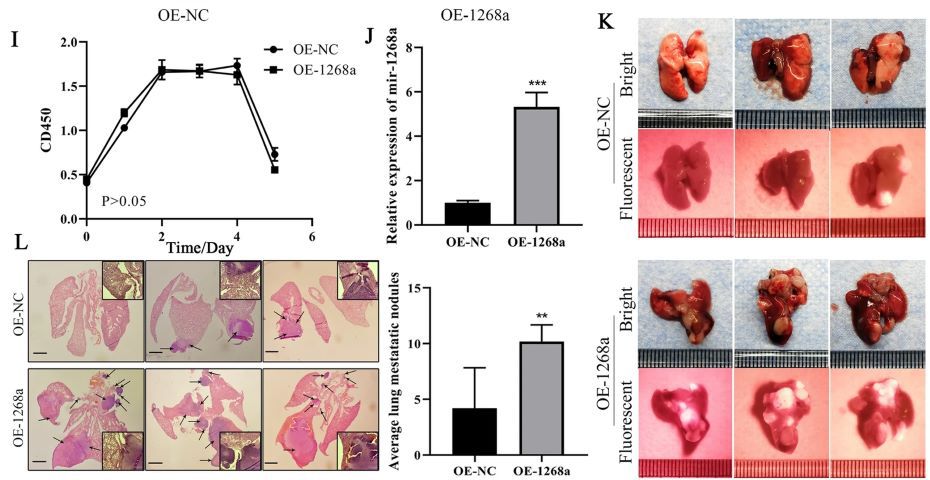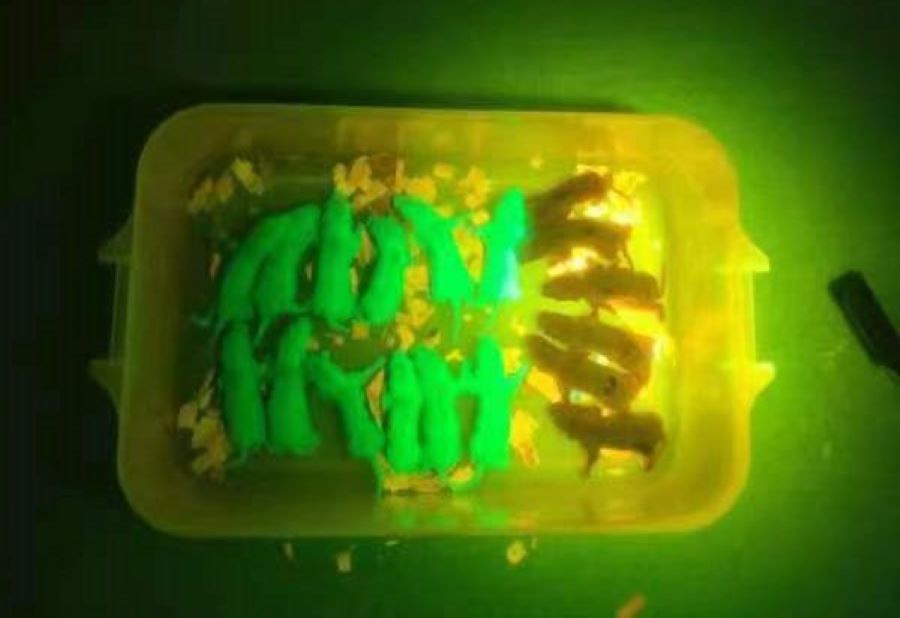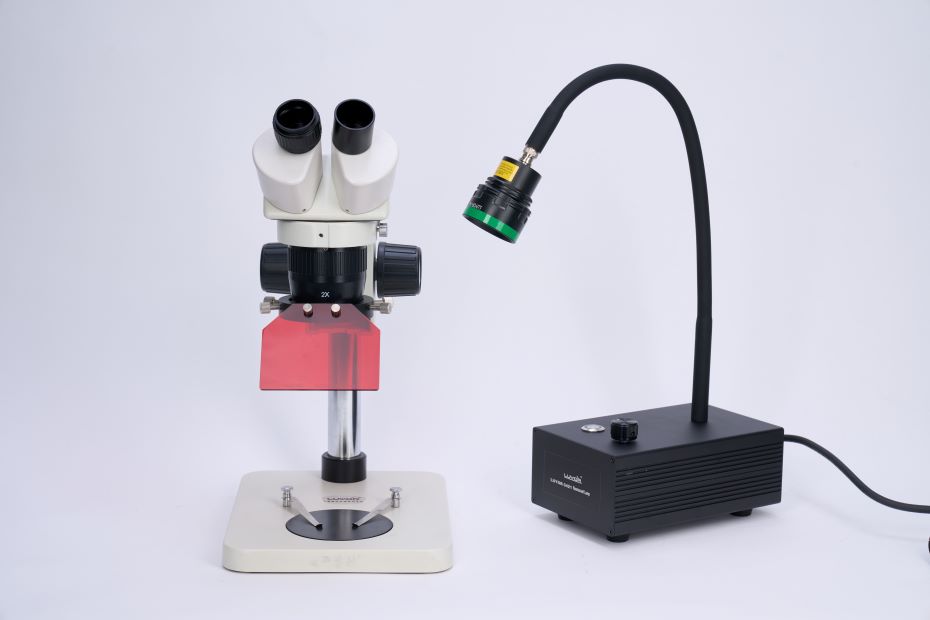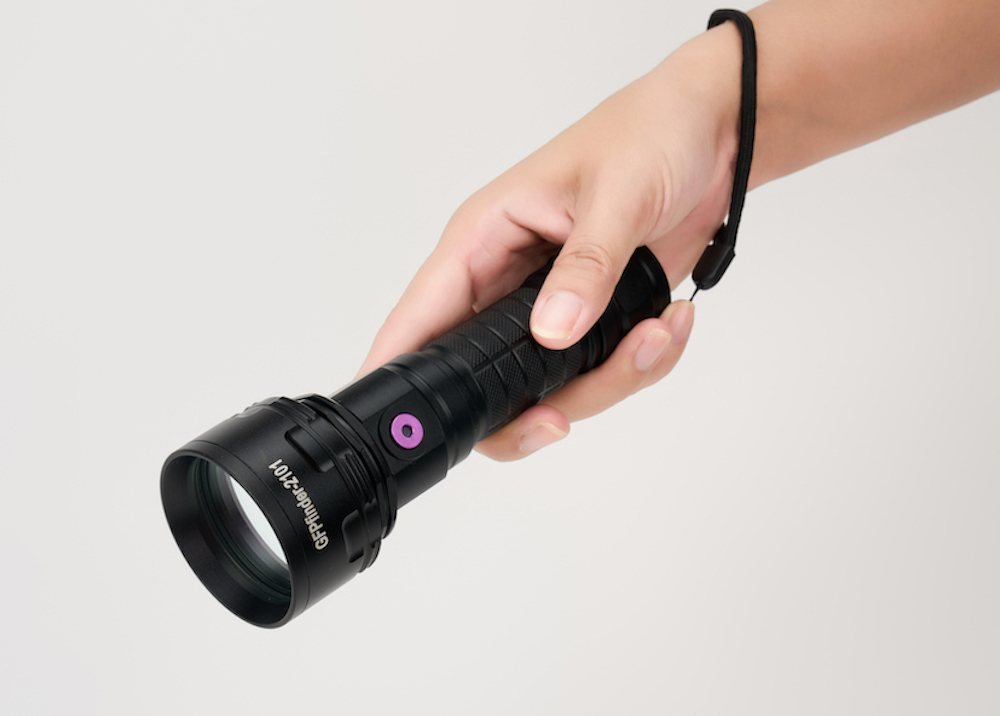2022年10月重慶醫(yī)科大學(xué)在《Biological Research》發(fā)表《Melanoma stem cells promote metastasis via exosomal miR-1268a inactivation of autophagy》文獻(xiàn),文獻(xiàn)中實(shí)驗(yàn)采用了LUYOR-3415RG雙波長(zhǎng)熒光蛋白激發(fā)光源和LUV-50A熒光觀(guān)察眼鏡觀(guān)察紅色熒光蛋白R(shí)FP在小鼠肺部腫瘤細(xì)胞的上的表達(dá)。
To study the effect of miR-1268a overexpression on OL cells metastasis in vivo, we generated OL cells stably overexpressing miR-1268a via lentiviral infection (Fig. 4J). 5 次 10^{5} OE-NC-OL and OE-miR-1268a-OL cells were injected into NOD/SCID mice via the tail vein, respectively (Sect. “Materials and methods”). All mice were sacrificed at day 35 after tumor cell injection. Since OE-NC-OL and OE-miR-1268a-OL cells were RFP-labeled, macroscopic metastatic foci formed at the lung could be visualize under external fluorescence imaging using LUYOR-3415 Dual Fluorescent Protein Excitation Light Source and LUV-50A Glasses. As shown in Fig. 4K, injected OE-miR-1268a-OL cells produced significantly more macroscopic lung foci than the OE-NC-OL cells (n?=?6). Subsequently, H&E analysis was performed on the largest cross-sectional lung sections of the two groups of mice. Statistical analysis showed that there were significantly more microscopic metastatic foci in the lungs of mice treated with OE-miR-1268a-OL cells (The black arrows show the formed metastases) (Fig. 4L). These observations show that miR-1268a can enhance metastatic colonization efficiency of OL cells that are oligometastatic. So far, we have demonstrated that miR-1268a, transferred from OL-SCs-derived exosomes to OL cells, can effectively augment the clonogenic colonization capability of OL cells to give arise to more extensive macroscopic metastases.

文獻(xiàn)地址:https://biolres.biomedcentral.com/articles/10.1186/s40659-022-00397-z
上海峰志儀器有限公司現(xiàn)貨供應(yīng)美國(guó)路陽(yáng)生產(chǎn)的LUYOR-3415RG手持式雙波長(zhǎng)熒光蛋白激發(fā)光源,能夠觀(guān)察綠色熒光蛋白和1紅色熒光蛋白在小鼠、斑馬魚(yú)、線(xiàn)蟲(chóng)等模式動(dòng)物上的表達(dá)。
推薦閱讀:
1.便攜式熒光蛋白激發(fā)光源LUYOR-3415RG
2.LUYOR-3415rg激發(fā)光源應(yīng)用案例
重慶醫(yī)科大學(xué)介紹:
重慶醫(yī)科大學(xué)創(chuàng)建于1956年,由上海醫(yī)學(xué)院(現(xiàn)復(fù)旦大學(xué)上海醫(yī)學(xué)院)分遷來(lái)渝組建,原名重慶醫(yī)學(xué)院,1985年更名為重慶醫(yī)科大學(xué)。學(xué)校是國(guó)務(wù)院學(xué)位委員會(huì)批準(zhǔn)的首批具有博士和碩士學(xué)位授予權(quán)的單位,是教育部批準(zhǔn)的首批來(lái)華留學(xué)示范基地。學(xué)校2015年成為重慶市人民政府、衛(wèi)生健康委員會(huì)(原衛(wèi)生計(jì)生委)和教育部共建高校,2016年成為“高等學(xué)校學(xué)科創(chuàng)新引智計(jì)劃”(“111計(jì)劃”)首批立項(xiàng)的地方高校之一。學(xué)校由位于渝中區(qū)的袁家崗校區(qū)和位于重慶大學(xué)城的縉云校區(qū)組成,校園總面積2650畝,其中縉云校區(qū)占地2100畝。校園環(huán)境優(yōu)美,風(fēng)景如畫(huà)。
重慶醫(yī)科大學(xué)現(xiàn)有全日制在校學(xué)生26810人,其中博士、碩士研究生7124人,本科生18824人,專(zhuān)科生258人(對(duì)口支援少數(shù)民族項(xiàng)目),留學(xué)生604人。學(xué)校具有招收博士后研究人員,港澳臺(tái)學(xué)生和外國(guó)留學(xué)生資格。學(xué)校現(xiàn)有8個(gè)一級(jí)學(xué)科博士學(xué)位授權(quán)點(diǎn)、13個(gè)一級(jí)學(xué)科碩士學(xué)位授權(quán)點(diǎn),3個(gè)博士專(zhuān)業(yè)學(xué)位授權(quán)點(diǎn)、11個(gè)碩士專(zhuān)業(yè)學(xué)位授權(quán)點(diǎn);4個(gè)重點(diǎn)學(xué)科,8個(gè)學(xué)科進(jìn)入ESI全球前1%(2022年1月科睿唯安數(shù)據(jù)),4個(gè)重慶市學(xué)科,16個(gè)重慶市“十四五”市級(jí)重點(diǎn)學(xué)科。
文章轉(zhuǎn)自:https://www.luyoruv.com/news/news1/673.html








 添加微信咨詢(xún)!
添加微信咨詢(xún)!